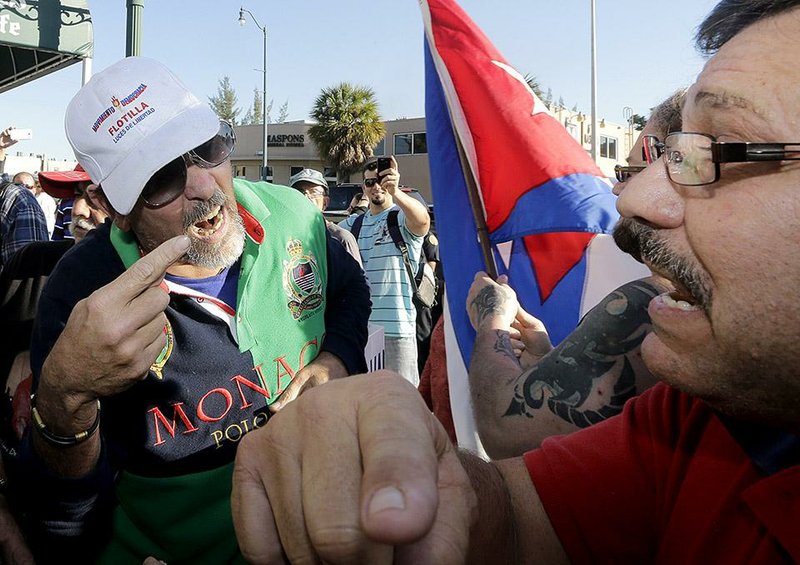MIAMI -- Some Cuban exiles in Miami were angry, but others were elated that President Barack Obama secretly arranged prisoner exchanges with Cuban leader Raul Castro as part of an effort to normalize relations.
RELATED ARTICLES
http://www.arkansas…">U.S. to mend ties with Cubahttp://www.arkansas…">In state, growers see trade potential
Obama's moves are "a betrayal not only of the Cuban people but of the American people," said businessman Remedios Diaz-Oliver, a board member of the U.S.-Cuba Democracy PAC, which lobbies for a hard line against the Cuban government.
"This is Bay of Pigs Two," she said, comparing it to the ill-fated U.S.-backed invasion of the island in 1961, when President John F. Kennedy failed to provide promised backup to Cuban exile fighters.
But some younger Cubans were thrilled.
"This is like a new age. It has reinvigorated the talks surrounding U.S.-Cuba relations, and for me that's the more important thing," said Daniel Lafuente, 27, the founder of tech hub LAB Miami.
Lafuente grew up hearing tales of suffering from his exiled mother and grandfather, but he said U.S.-Cuba policies seemed frozen in the past.
"Now there's going to be a greater enthusiasm for trying out new means of interacting economically, socially, culturally. It's a really big step. Cuba is back on the map," he said.
Miami's Little Havana neighborhood has been the heart of the Cuban exile community for half a century, the go-to place for protests against Cuban leaders Fidel and Raul Castro and demonstrations in favor of the U.S. embargo on trade and travel with the island.
But there was little immediate reaction in the streets to Obama's surprise announcement that he's pursuing an end to more than 50 years of U.S. attempts to isolate the island -- just a small group of vocal activists outside Versailles, the popular Cuban-American restaurant on Eighth Street.
Crowds watched closely on TV as Obama and then Raul Castro announced the changes. At the El Pub restaurant, waitresses paused. One server wiped a tear from her eye as she clasped her hands, overcome with emotion at changes no one believed would come.
Down the street at a barbershop, patrons briefly applauded after Obama finished speaking, but then spoke in more measured tones about how these are just first steps toward real change.
Cuban-Americans today are less likely than they have been in the past to insist on trying to isolate Cuba's communist government, polls show. Younger generations and the more recently arrived tend to be more open to exchange and dialogue.
Some older exiles whose relatives were killed or imprisoned after the 1959 revolution seemed stunned by the prisoner release and shocked even more by Obama's other executive actions.
But Cuban-born Raul Hernandez, 60, has lived in Miami for 35 years and has two brothers still in Cuba. Travel restrictions kept him from seeing his parents before they died.
"I think the embargo has not been good for the Cuban people because the government never changed," he said.
Obama said he would work with Congress to end the U.S. embargo, but meanwhile will act on his own to encourage a freer flow of travel, commerce and information.
Ramon Saul Sanchez, who runs a group dedicated to helping new arrivals from Cuba, said he had suspected Obama was ready to take a "radical step," but had no idea of its magnitude. "This isn't a setback -- it's actually a challenge" for an exile community accustomed to business as usual, he said.
Jose Basulto runs Brothers to the Rescue, a group of pilots who dropped leaflets promoting democracy over the islands until one of the group's planes was shot down by a Cuban fighter jet.
He said he's glad to see former USAID subcontractor Alan Gross return home from a Cuban prison, but dismayed that three Cuban spies were released in the swap, including one serving a life sentence in connection with the shoot-down.
"I am happy for Gross, but on the other hand, it is incredible that the Obama government has played so lightly with the U.S. justice system," he said.
Still, many of Obama's moves have been recommended by a growing number of Cuban-Americans in recent years, including business leaders.
"We have long advocated for steps that improve human rights and opportunity for the Cuban people and which break the isolation between our two countries. The steps taken today by the governments of the U.S. and Cuba are historic," said Carlos Saladrigas, chairman of the business-backed Miami-based Cuba Study Group.
Meanwhile, people in Cuba also were split between celebration and sorrow after Castro announced that his country was restoring relations with the United States.
At the University of San Geronimo in the capital's historic center, the announcement drew ringing from the bell tower. Throughout the capital, there was a sense of euphoria as word spread.
"For the Cuban people, I think this is like a shot of oxygen, a wish-come-true, because with this, we have overcome our differences," said Carlos Gonzalez, 32, an information-technology specialist. "It is an advance that will open the road to a better future for the two countries."
But others disagreed.
Yoani Sanchez, a renowned Cuban blogger critical of the government, said Castro could now claim a triumph and that he had made a "bargaining chip" of Gross.
"In this way, the Castro regime has managed to get its way," she wrote in a blog post. "It has managed to exchange a peaceful man, embarked on the humanitarian adventure of providing Internet connectivity to a group of Cubans, for intelligence agents that caused significant damage and sorrow with their actions."
Information for this article was contributed by Gisela Salomon, Kelli Kennedy, Tony Winton, Andrea Rodriguez and Anne-Marie Garcia of The Associated Press.
A Section on 12/18/2014
